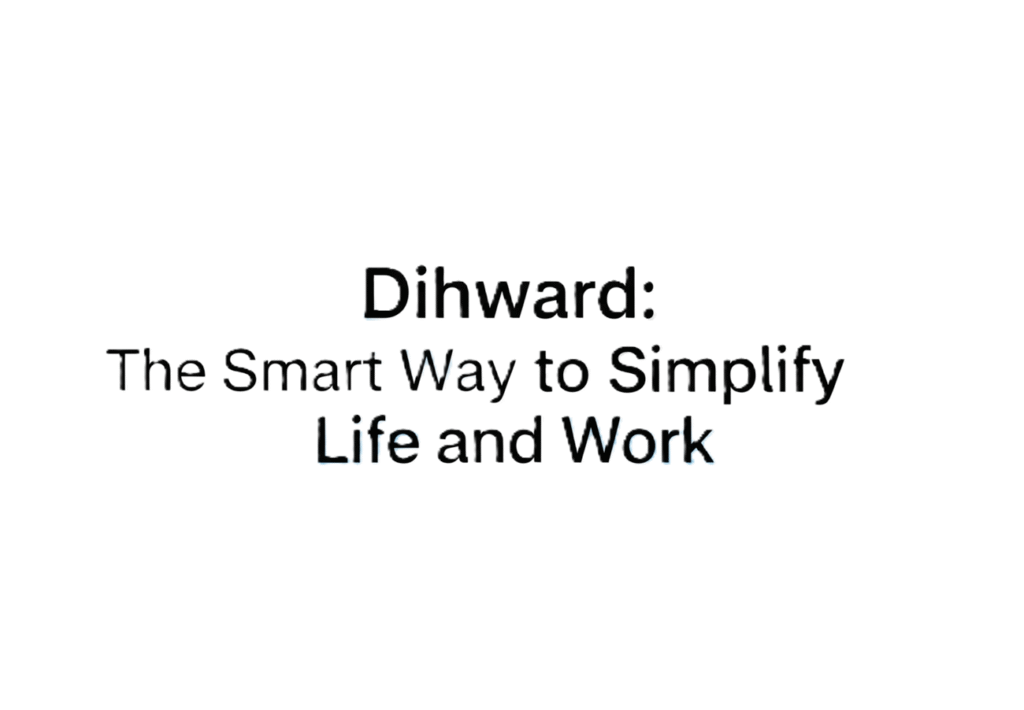As the pace of change, from digital to cultural to environmental, accelerates, the quest for frameworks that upset the economy revolving around ethical integrity will be in demand. Dihward has become an important idea in this regard because it serves as a handbook for ethical adaptability and structured resilience. You’ll find a comparison of two Dihward articles below, followed by a combination of the best insights and practical tips. It is a guide that helps you sensibly make sense of dihwrd, ultimately no matter what they do or where they do it.
What Is Dihward?
Dihward stands for more than just resilience or flexibility in turbulent times; it’s a holistic framework ensuring that adaptation is always grounded in ethics. The word itself combines the essence of grounded stability (“Dih”) and protective, purposeful direction (“Ward”). It envisions a world where individuals, organisations, and societies can advance, transform, and innovate, without forsaking integrity or trust.
Why Dihward Matters Now
Today’s world presents unique challenges:
- Tech-Driven Disruption: AI and automation redefine industries at a relentless pace.
- Resource and Climate Stakes: Sustainable growth must avoid short-termism and exploitation.
- Social Fragmentation: Truth, unity, and shared values are increasingly rare, making ethical guidance essential.
Dihward answers this call with structured guidance, championing both progress and principle.
The Six Pillars of Dihward
| Principle | Description |
| Value Anchoring | Root all actions in unwavering ethical foundations. |
| Structured Flexibility | Embrace change without losing core identity. |
| Proactive Foresight | Anticipate challenges and prepare ethically for disruption. |
| Ethical Accountability | Ensure all decisions meet transparent and responsible standards. |
| Resource Prudence | Think long-term about resources—don’t sacrifice tomorrow for today. |
| Collective Synergy | Build community and collaboration; resilience thrives in trusted networks. |
How Dihward Works in Practice
- Governance: During pandemics or urban planning, Dihward urges policymakers to prioritise fairness, inclusivity, and civil liberties while embracing necessary change.
- Business: Companies guided by Dihward innovate responsibly, balancing agility with worker and societal welfare.
- Technology/AI Ethics: Dihward-aligned tech leaders embed accountability, transparency, and bias checks directly into their systems.
- Personal Development: Emotionally resilient individuals cultivate Dihward by regularly re-evaluating values and planning ethically for life’s uncertainties.
Old Paradigms vs. Dihward
| Aspect | Dihward Approach | Traditional/Old Model |
| Ethics | Central, constant | Often reactive or secondary |
| Adaptation | Purposeful, prepared | Unanchored, short-term |
| Decision-Making | Inclusive, transparent | Top-down, opaque |
| Resource Management | Mindful, sustainable | Focused on immediate gains |
| Community Engagement | Continuous, foundational | Crisis-driven, sporadic |
| Technology Use | Woven with ethical checks | Prioritises efficiency alone |
Real-World Benefits
- Greater trust: Change implemented with Dihward earns public buy-in, improving social cohesion and stability.
- Sustainable innovation: Organisations and leaders make responsible decisions, avoiding the pitfalls of short-term gains.
- Mental health: Individuals armed with Dihward experience less anxiety, more clarity, and a stronger sense of purpose.
Common Misconceptions, Debunked
- Dihward resists innovation: Not true. It pursues principled progress, change for good, not just for growth’s sake.
- It’s just armchair philosophy: False. Dihward drives real-world policies, legislation, company practice, and personal development.
- Anti-tech? No. Dihward advances technology with built-in ethical guardrails.
Building a Dihward-Oriented Culture
Start with these steps:
- Audit and define your non-negotiable values.
- Simulate disruption scenarios, test for ethical stress and resilience.
- Design systems to self-correct and flag ethical risks automatically.
- Foster open community and team dialogue, ensuring co-creation not just top-down mandates.
- Commit to ongoing learning, make Dihward a continuous journey, not a one-time goal.
The Road Ahead
Dihward is gaining recognition in policy, business, technology, and education worldwide. As AI, climate change, and social complexity intensify, the demand for frameworks that balance agility with accountability will grow. Expect curricula, compliance standards, and leadership models to increasingly reference Dihward.
FAQs about Dihward
What does Dihward mean, short and simple?
Dihward is a framework for ethical adaptability: purposeful change anchored in trustworthy, enduring values.
How is Dihward different from being resilient or flexible?
Resilience is reactive; flexibility is a quick shift. Dihward is proactive, aligning every change with clear ethical standards for lasting impact.
Where can I apply Dihward?
Anywhere change meets challenge: government, business, technology, education, social projects, and personal growth.
Is Dihward just for organisations?
No, individuals, families, communities, and industries can all use Dihward to guide ethical progress.
Why is Dihward critical in today’s technology-driven age?
Because digital transformation and AI demand constant change, Dihward makes sure we innovate without losing our ethical identity.
How do I start using Dihward personally?
Define your core values, prepare for change, build self-correcting habits, and seek community collaboration.
Can Dihward make a difference in social fragmentation?
Yes, by emphasising continuous, values-based dialogue and trust, Dihward helps bridge divides and create shared solutions.
What are some examples of Dihward in action?
Cities are balancing development with protections for historic districts, companies ensuring digital transformation supports vulnerable employees, and technologists building fair AI systems.
Is Dihward practical or aspirational?
It offers concrete steps, but always stretches organisations and individuals toward a more responsible future.
How will Dihward shape tomorrow’s world?
By integrating ethics into change, Dihward will enable societies to progress sustainably, build lasting trust, and manage complexity with clarity.
Closing Thoughts
Dihward is more than a trendy phrase; it’s a deeply relevant survival compass for our dynamic and often unpredictable era. As technological, social, and environmental shifts intensify, Dihward offers a way to adapt without losing sight of what matters most. Whether you’re leading a business, governing a city, developing new AI, or simply seeking personal growth, let ethical adaptability guide your path, and Dihward is your framework for doing just that.










